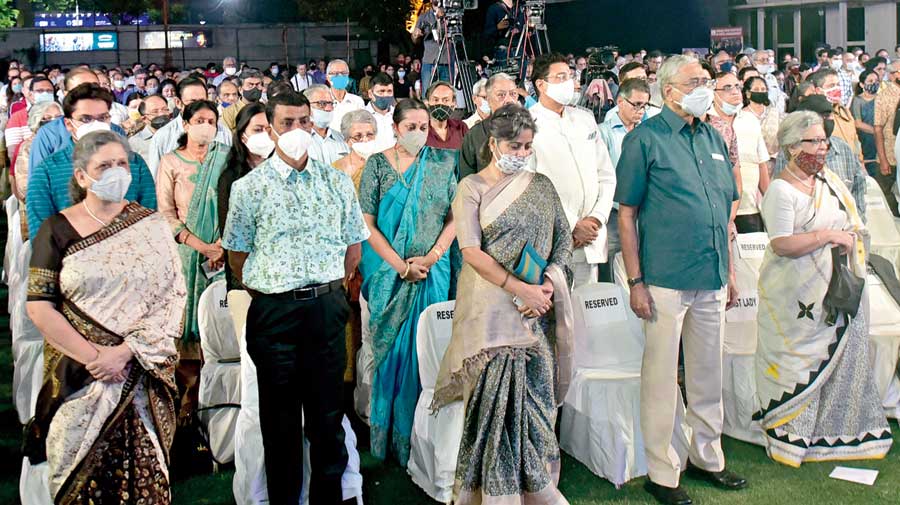WHAT
Calcutta Club The Telegraph National Debate 2021, presented by Subhas Bose Institute of Hotel Management, powered by Calcutta Business School, a unit of Shikshayatan Foundation, in association with Pan Bahar
WHERE
Calcutta Club Lawns
MOTION
During the pandemic, India failed to balance lives with livelihood
VERDICT
The motion was carried
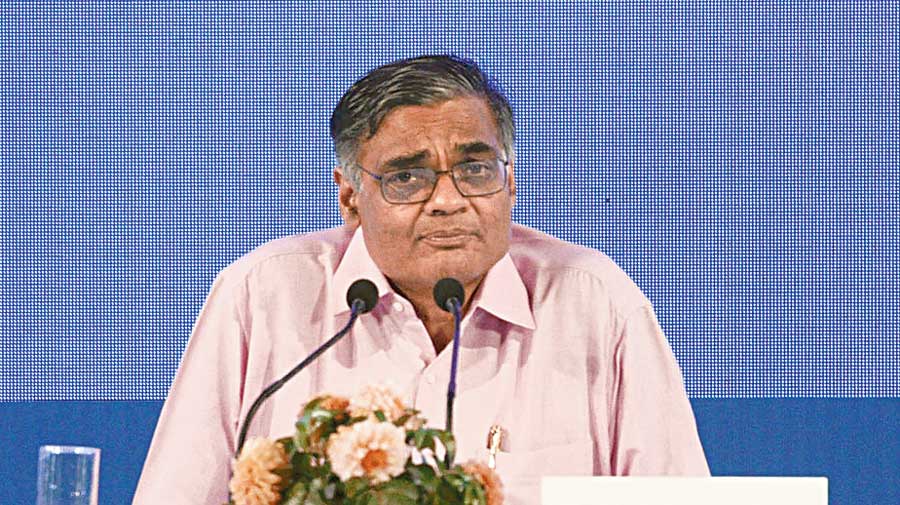
Moderator: Sandip Chatterjee
For the motion
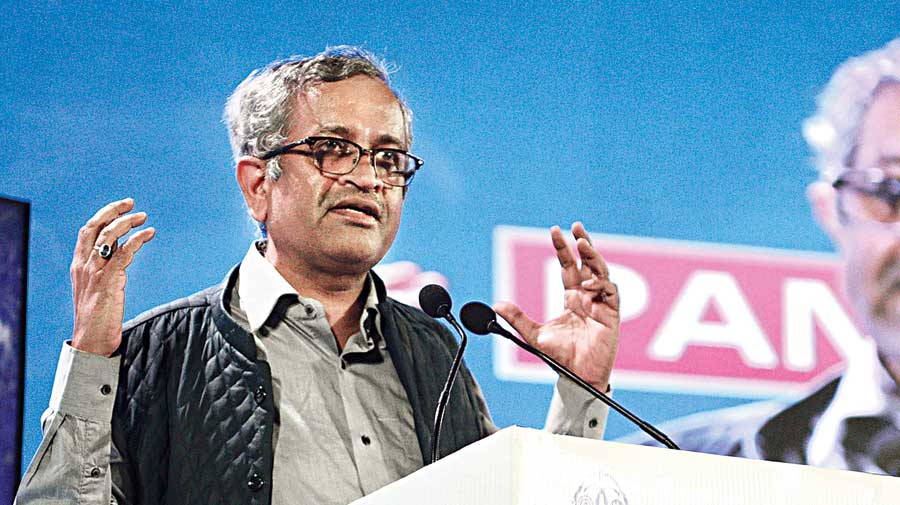
For the motion: Sanjay Hegde
Sanjay Hedge
Supreme Court advocate
The first Covid case appeared in India on January 27 in Kerala’s Thrissur. It was a medical student who had come from Wuhan. At that point of time India was greatly looking to something else on a war footing. On February 24, Donald Trump was to come to India and we were to say kemchho kemchho kemchho. Everything was put on hold for that. The one thing that we needed to put on hold, the one place we needed to check — our airports — were kept open. We kept them open because we needed the international press, we needed our NRIs who wanted to come to the jamboree not to be disturbed. So we let them come.
On March 24, we were all told: sit in your houses. What we did not envision was those who were barely one payment away from starvation. As somebody put it: Guna passport-o ne ki/ aur sazaa mili ration card ko.
Even today, the thinking is still the same. We are now among the world’s largest producer of vaccines. If we are to balance between lives and livelihoods, why is this that our vaccine producing factories are not working to full capacity? That is a question that Delhi High Court has asked the government. If we had ramped up vaccine production and delivery, that itself would have generated employment. But no, we have to have our vaccines delivered in a regulated form. It doesn’t matter even if it takes us three years to vaccinate everyone at the current rate.
You are tomorrow (on Sunday) going to welcome the Prime Minister here. Please ask him where are the vaccines? You (the Prime Minister) promised them in Bihar, are you at least bringing them to Bengal?
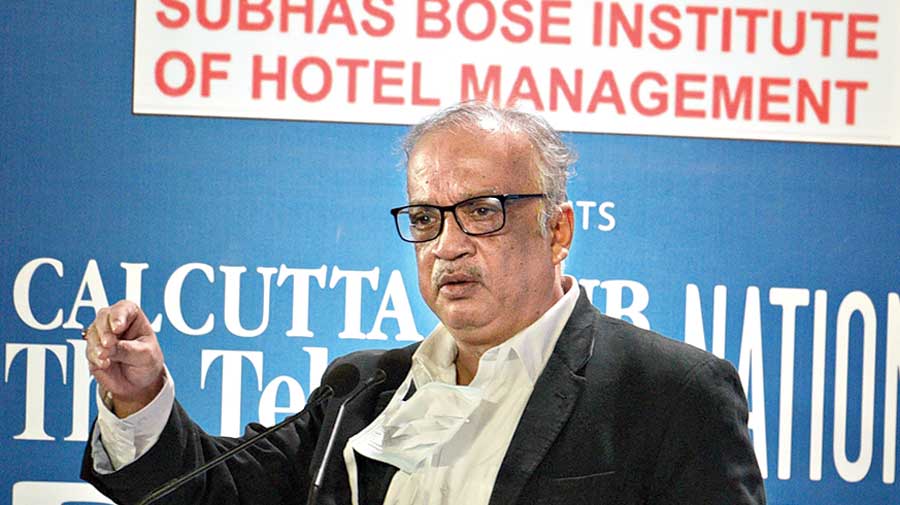
For the motion: Kunal Sarkar
Kunal Sarkar
Cardiac surgeon
No matter how triumphantly nationalistic you are, Covid, unlike the Internet, jet engine and everything else, did not originate in India. It is not quoted in Indian mythology, it happened somewhere else and it had to be brought to our country.
It is not a pandemic that spread by physical movement but by flights. As Taiwan, Thailand, Vietnam, every country in physical proximity of China had shut their gates down in late December (2019), early January (2020), we waited till March 20. In the last seven days that the flights were open, something around 20 to 25 lakh passengers came in from Europe and the US at a time Europe and the US were running an infectivity rate of around 20 per cent which meant that we invited around five lakh infections only in the last week through the main airports of Delhi and Mumbai.
In Bengal, we are far sighted. So, 20 years ago, our forefathers had cautioned. So, we don’t have any international flights. We were all ready for the pandemic. But yet migrant labourers introduced the infections to us and even the poor Bengali was not spared.
We had the entire three million square kilometres of India locked down monolithically at once. That is not possible. India is not going to behave as a homogenous contiguous entity.
We had a stringent lockdown. But what was missing? When we contained people, we did not trace them adequately. We lost our enthusiasm for contact tracing. We satisfied our physicality of the lockdown but the epidemiological core of the problem was not addressed. Answer me one question this evening. Who is India’s chief epidemiolo-gist? Every civilised nation on the earth knows who is leading their epidemiology programme.
There is an entity in India, called the Centre for Disease Control, located in Pune. Perhaps the central government thought it was in hostile territory, in Maharashtra. So… I am going to hand over the control to ICMR, which is an august body of very peace-loving quite gentlemen and women who are engaged in research…. Not because you have the right men there but because you have the yes men. One month into the lockdown, there was a meeting of the empowered committee…. The chairman of the empowered committee, speaking on April 24, guaranteed everybody that there will not be a single RNA molecule left in India by May 16. This is the intellectual input that went into the formulation of the lockdown.
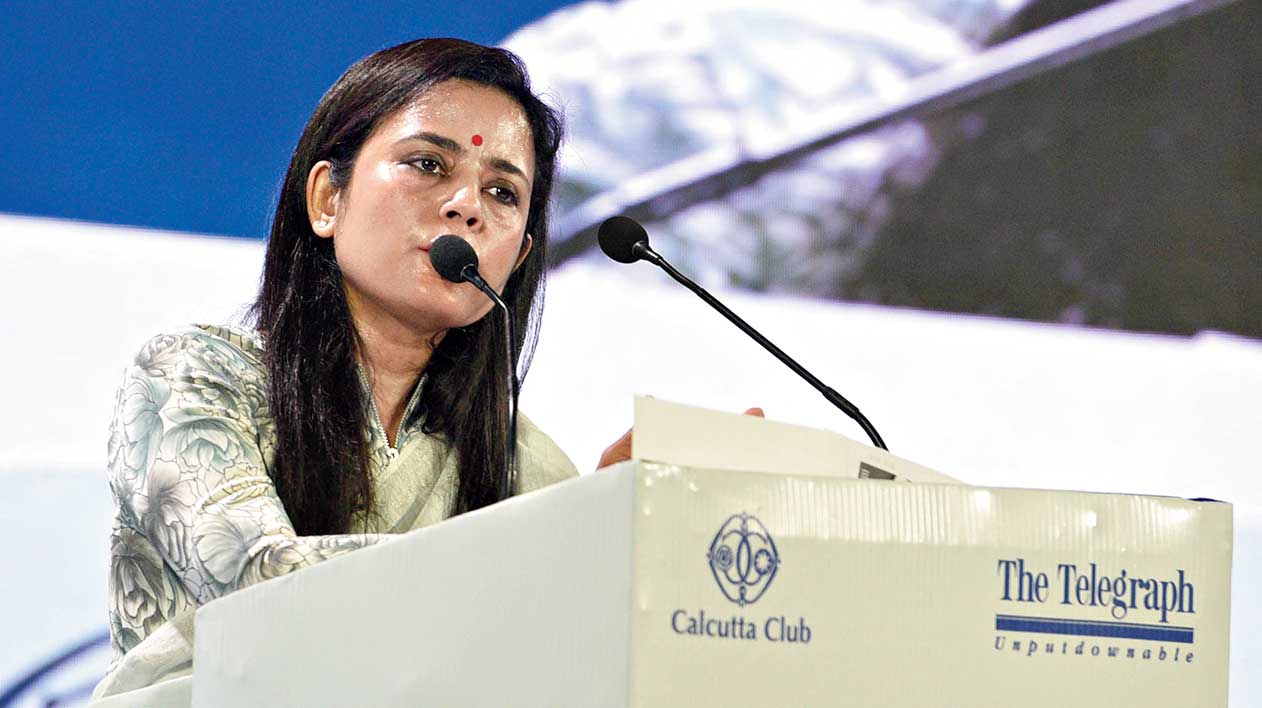
For the motion: Mahua Moitra
Mahua Moitra
Trinamul Congress MP
Today actually I will steer clear of the politics of it and stick to what the real issue at hand is. We can start with whether Nehru, actually Babur or the marauding Mughals were to be blamed for Covid being brought into India. I could start with that, but I don’t think it would take us anywhere. What this pandemic has shown us… is that there is such a wide gap in our understanding of India, especially crises in India.
Lockdown, on the face of it, was the right thing to do. But the government, which has the ability to mobilise lakhs of troops overnight, surely had the ability to give clarity to the movement of the migrant workers — 30 million people who were stuck in different cities. That is where this government failed… no government is here to be rewarded
on what they did right. That’s is what is needed to be done. We cannot be applauded for saying “I saved so many lives”.
The question is 30 per cent of India’s workforce is made up of migrant workers. What the government did in the manner they did it, was completely blind and callous to the plight of these migrant workers. I think that is where we failed completely to balance lives and livelihoods.
We had Mr Basu talk about the direct benefit transfers. Shall I give you one statistic? The direct benefit transfers that were handed out by the government till date are to the tune of Rs 113,000 crore. This government took back from the same people exactly hundred and thirteen thousand crore by way of extra cess on gas and patrol.
When we talk of the collateral damage… we had over 800 migrant deaths due to road accidents. How many people like you and me died due to road accidents because we happen to be working on the road during the pandemic and truck mowed down?
Having to deal with two to three lakh people who came back to my district alone, getting off the trains, looking after them, one thing that will stay with us, is as a nation we have dehumanised our people. More than anything else, whether this government has failed or whether this government has failed to improve the economy…. I think what this pandemic has done, has brought shame, the feeling of shame and feeling of humiliation among us, which will stay with us for a long time.
Against the motion
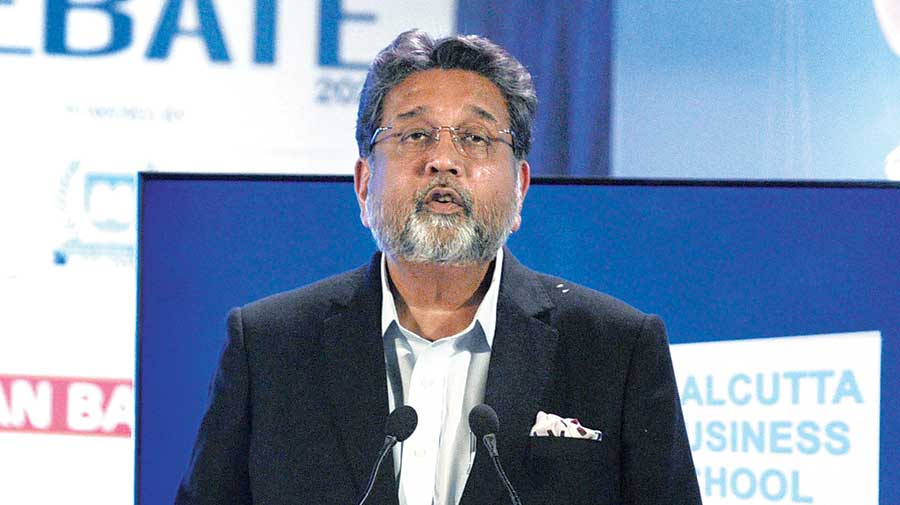
Against the motion: Harshavardhan Neotia
Harshavardhan Neotia
Industrialist
Obviously we had a terrible first quarter. We had also a significant recession of almost 8 per cent, but in the third quarter we are seeing some green shoots with a marginal recovery above the zero point and we hope that we will have a better fourth quarter.
I must mention here that as a businessman I am someone who has been directly impacted by this pandemic. I am in real estate and hospitality business. These have been in the front of taking the brunt of the pandemic…. In fact, you see this salt and pepper beard (pointing towards his beard). It is also outgrowth of the terrible stress that I went through. A friend of mine on a lighter note said: “Harsh, you have lost weight”. I said: ‘Yes’. The loss is directly proportional to the loss in wealth and income.
But having faced the brunt of this, I see in the last few months a sharp recovery. People are coming back to the restaurants, people are coming back to buy properties. Construction is now almost at full swing. Things are opening up. City properties are not doing so well because we still have air connectivity internationally down.
My personal view is that we have been, as a country, both able to manage relatively better than the rest of the world. Of course we have lost lives, of course we have lost livelihoods. But the question is: how do you respond in the event of a pandemic. I think Bengal, as a state, has done remarkably well in both seeing to it that succour and help reach the people on time. I think, as a country, we have responded with the given knowledge, with the given situation reasonably well.
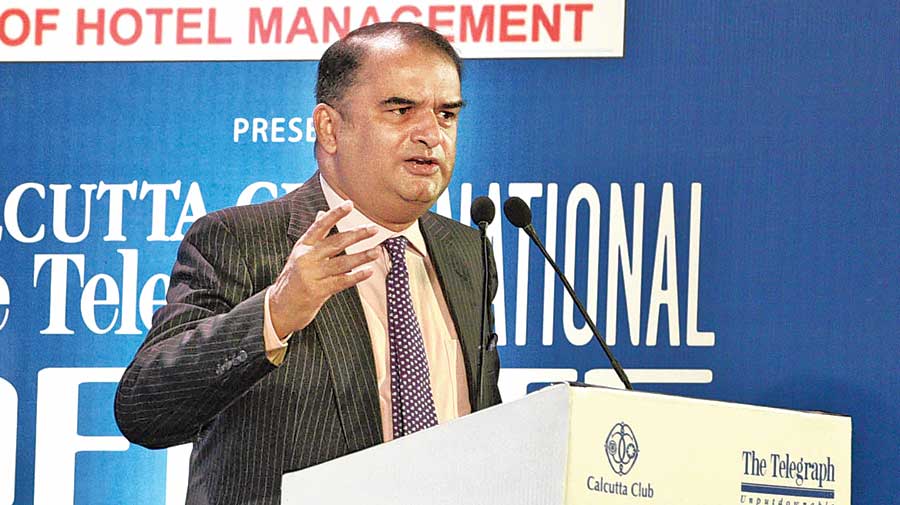
Against the motion: Prasenjit K Basu
Prasenjit K Basu
Economist and history enthusiast
Let me start with what Kunal Sarkar said about east Asia (Sarkar had lauded the effort of East Asian countries in containing the pandemic). East Asia did not just have this recent pandemic. East Asia had several. They had faced the SARS pandemic in 2003. There have also been several bird flu epidemics. East Asians have a lot of experience. Taiwan has in particular done very well during this pandemic because they had the terrific experience of dealing with a pandemic.
In India, the proportion of death is so much lower than what the epidemiologists suggested. While 5 per cent of Indians died from the coronavirus of 1919, 0.1 per cent India’s population died from the coronavirus of 2020. India now accounts for 17.7 per cent of the world’s population but accounted for 6 per cent of global deaths from the current coronavirus.
When some 20 million internal migrants returned to their rural homes, Modi’s new India provided them options — either take on an emergency Mahatma Gandhi National Rural Employment Guarantee Act (MNREGA) job to help create some capital assets in your village or borrow a MUDRA micro loan to help create and start a new enterprise. Or after an appropriate period of lockdown, rest, take up a new industrial job taking advantage of the new labour codes that are resulting in a rebound in both domestic and foreign direct investment in this country.
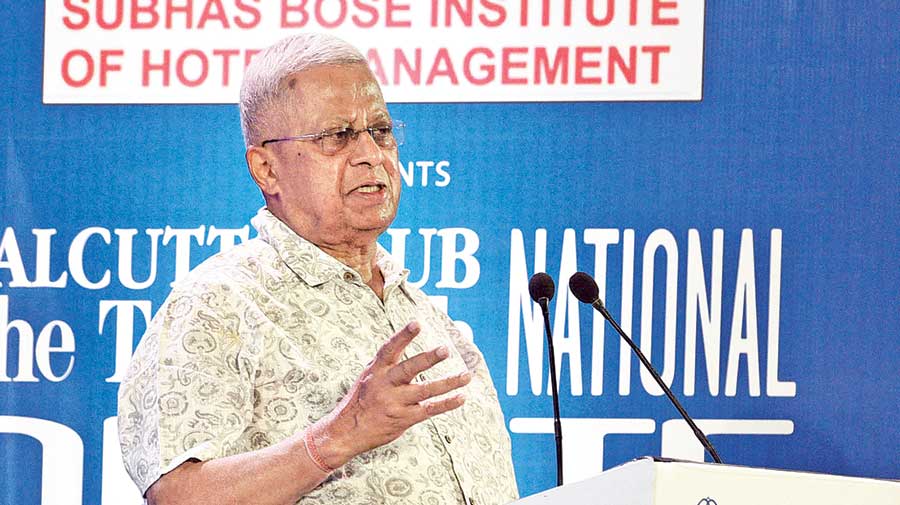
Against the motion: Tathagata Roy
Tathagata Roy
Former governor
I have been at a loss to understand the motion of the debate. Saving lives is a matter of medicine. Saving livelihoods is a matter of economics. The two don’t have much to do with each other but we have tried to connect the two in the motion which, to me, makes little sense but I was reassured by the fact that I had to speak against the motion.
Can anyone plan for a bolt from the blue? I would say that we were plunged into a sea of uncertainty that can be compared to the state of Columbus when he was navigating across the unknown Atlantic. Was it possible for anyone in this country or any other country to device methods of doing things in a most beneficial and optimal manner? I think not.
Despite all the uncertainties, we tried to create a regime in which people could be persuaded to behave in a particular way and which will prevent deaths. In the process, we were plunged into great confusion also.
When the lockdown was imposed, it was for three weeks. Eventually, it was extended for many more months. Why was it initially imposed for three weeks? Because we did not know where we were going. But certain people had certainties. So, they said ‘this is not pandemic’. Donald Trump said it in the US and someone said in Calcutta: “this is merely a subterfuge to draw people’s attention away from the communal riots in Delhi”. The things started getting worse and worse and the narrative gradually changed.
The knocking of utensils had brought forth a lot of ridicule. Knocking of utensils would not drive away corona. Nobody ever said it would drive away corona. But it was required the consciousness in people that we were to behave in a certain way in these circumstances.

The audience at Calcutta Club on Saturday gave an overwhelming aye in favour of the motion — During the pandemic, India failed to balance lives with livelihood. Put to vote by moderator Sandip Chatterjee, the hands raised for the proposition (left) outnumbered those raised against (right)
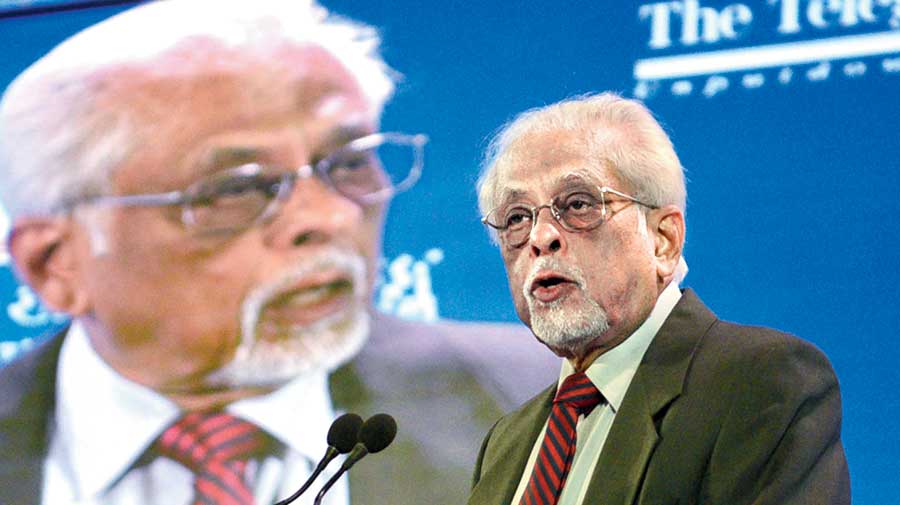
Partha Ghose
Partha Ghose
President, Calcutta Club
2020 was a devastating year for humanity, causing unprecedented suffering, loss of lives and livelihood.... The lockdown versus no-lockdown debate, that is life versus livelihood debate, was sparked off by two academic groups, one based in the University of Oxford and the other at Imperial College, London.
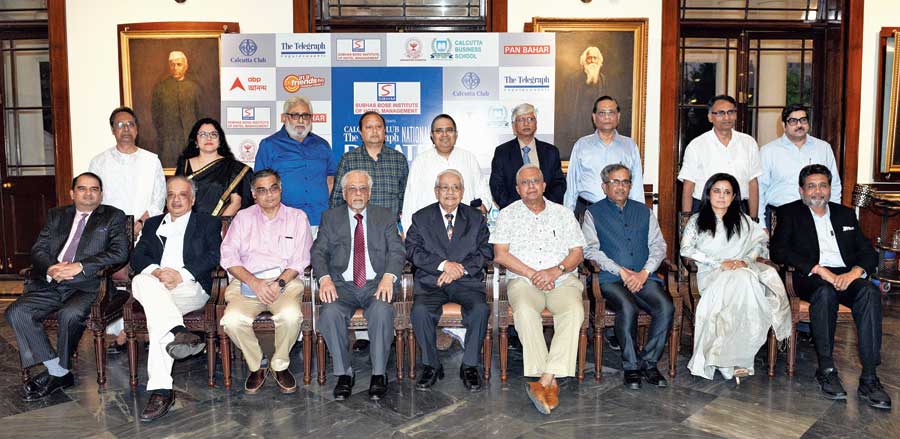
Committee members of Calcutta Club with the participants in the Calcutta Club The Telegraph National Debate 2021, presented by Subhas Bose Institute of Hotel Management, powered by Calcutta Business School, a unit of Shikshayatan Foundation, in association with Pan Bahar
Many countries opted for lockdown as did India, though a bit late. After nearly a year, the so-called curve has flattened considerably... and luckily vaccines are also available. But Covid-19 won’t go away. It is here to stay because it started mutating before vaccines were available. Remember, small pox took nearly a decade to eradicate and polio is still around after 30 years of vaccination... Common cold is also a coronavirus and we are all used to it.
We have to get used to Covid-19 as well.


